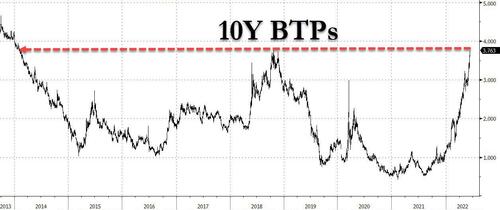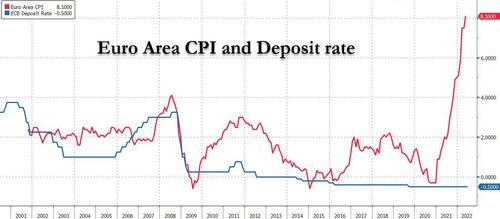CIO: Investors Must Seriously Consider The Collapse Of Europe As “Whatever It Takes” Doesn’t Work At 8% Inflation
By Eric Peters, CIO of One River Asset Management
“We have always known how to combat this fragmentation: in 2010, in 2012, in 2020, every time with different instruments,” declared the European Central Bank’s Villeroy. “Nobody should have any doubt, including on markets, over our collective will to prevent fragmentation,” continued the Frenchman, Italian government bond spreads widening.
“We have the will, and nobody should doubt we will have the instruments if and when necessary.” But this of course, left those of us who are paid to entertain doubts to wonder what will mark the point where it becomes necessary for Europe’s central bank to intervene in markets, creating euros to then purchase peripheral bonds.
“There is no specific levels of yields increase, or lending rates or bond spreads that can unconditionally trigger this or that,” explained Christine Lagarde, ECB President, when asked for details.
“We will determine on the basis of circumstances, of countries, how and when that risk is likely to materialize and we will prevent it,” she asserted, hopeful that such ambiguity will discourage speculators from pushing markets to the point where the central bank pledged to act. “But we are committed – committed – to proper transmission of our monetary policy and as a result fragmentation will be avoided to the extent that it would impair that transmission,” said Lagarde, confident.
But no two crises are the same. In 2010, 2012, and 2020, European inflation in Europe’s north was virtually non-existent. In 2012, when President Draghi declared the ECB would do “Whatever it takes,” European inflation was 2.35%.
In a world of perpetually low inflation, the power of central banks to create money with which to prevent fragmentation – also known as subsidizing cohesion – appears unlimited, costless. But in a world of high and rising inflation, subsidies risk boosting inflation and de-anchoring expectations.
Investors must contemplate all outcomes and are left to evaluate the probability northern Europeans are willing to bear such costs on behalf of their southern neighbors now that EU inflation is 8.1%.
Tyler Durden
Sun, 06/12/2022 – 18:30
Zero Hedge’s mission is to widen the scope of financial, economic and political information available to the professional investing public, to skeptically examine and, where necessary, attack the flaccid institution that financial journalism has become, to liberate oppressed knowledge, to provide analysis uninhibited by political constraint and to facilitate information’s unending quest for freedom. Visit https://www.zerohedge.com

